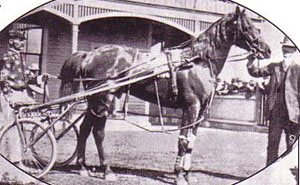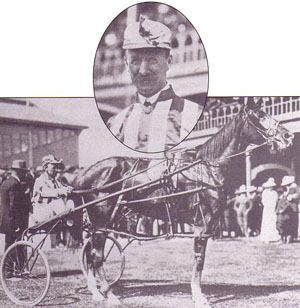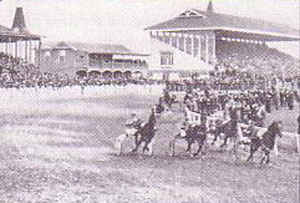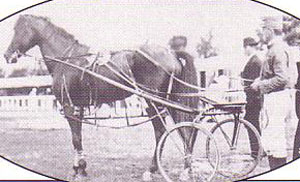| FEATURE RACE COMMENT |
YEAR: 1913
 |
| Ravenschild & trainer-driver Newton Price |
The three-day meeting, scheduled for November 11,13 and 14, 1913, was initially in jeopardy. The club held a special committee meeting on November 5 to consider a postponement because of the national waterside strike that had gripped the country. However, the club decided to keep faith with all the horsemen who had already made the long trip to Addington, and proceeded with the meeting. As it transpired, the strike did not prevent any horse from competing, or, apparently, any person from attending.
Ravenschild won the race in hollow fashion from the Australian pacer Denver Huon, with Calm, the race favourite and unbeaten in three starts, a fair third.
The winner, who had been runner-up the year before, gave his sire Rothschild his third Cup success. Such was the large stake offered that Ravenschild was the season's leading earner with £1130, all but £30 coming from his Cup win. The stake for the 1913 New Zealand Cup reached 2000 sovereigns for the first time, the qualifying time was tightened to 4:38, and for the first time a prize for fourth place was offered. Ravenschild's share of the stake was 1100 sovereigns, Denver Huon 400, Calm 300 and Manderene 200. Total stakes offered by the club over the three days were 8000 sovereigns. The Canterbury Jockey Club, which had been in existence more than 50 years, also had a 2000 sovereign stake for it's traditional November New Zealand Galloping Cup. The Metropolitan Club, in just nine years, had raised the stake of it's prestigious race from 310 socereigns to the equal of its more illustrious provincial companion.
Totalisator turnover on Cup Day was a record £42,558, and the Cup betting of £7257 10s was also a record. For the first time the turnover eclipsed the Canterbury Jockey Club's betting on its Cup Day, held as usual three days before the Trotting Cup. The three-day Addington turnover reached a record £124,362, up £25,185 on the previous year.
The club received 23 nominations for the Cup, and only Bell Metal and Princess Louise were withdrawn, which left an over-capacity field. Twelve horses started from the front line of six seconds and from that mark Ravenschild was quickly into the lead for Newton Price. Passing the stands for the first time, Lord Dillon headed Ravenschild, who was followed by Manderene, Little Tib, Aberfeldy, Stop It and Calm. Well rated by his trainer-driver, Ravenschild regained the lead shortly after and by the time the straight was reached was going too well for the others. He finally won by eight lengths in 4:35.6.
Denver Huon, the Australian champion from Sydney, came to the meeting with a reputation for exceptional speed, and from his handicap of two seconds ran a fine race. He had to make his way through the big field, and was timed at 4:33.4. Denver Huon was under the care of Manny Edwards, who had migrated to New South Wales and set up a stud farm and training establishment. Edwards' horses arrived by sea via Melbourne, Hobart and Bluff. The trip was a rough one and Denver Huon, in particular, lost condition. As a result he had worked poorly before a good final trial on the Sunday before the Cup, which convinced his connections to continue with the race.
As expected with such a big, unwieldy field, the start was unsatisfactory. The horss paraded past the stands and then walked to the starting point. They began racing some lengths before reaching the post, getting off in straggling order. Again, Andy Pringle bore the brunt of the disorder and was tipped from the sulky of Glendalough. King Cole, Medallion and Gold Bell broke hopelessly and took no part in the contest.
The Wildwood Junior-Gertie six-year-old Calm, who started from the front, lost his unbeaten record after a slow start. Passing the stands the first time, Bill Kerr's pacer was six seconds behind the leading division. He gradually moved up and, starting the last lap, had moved into third place. Calm chased Ravenschild into the straight and broke, allowing Denver Huon to pass him.
King Cole (out of retirement) had broken Ribbonwood's mile record in 1911, registering 2:08.6. He shared the scratch mark with his co-Australasian mile record-holder Emmeline, who recorded her mile time in the 1912-13 season.
Andy Pringle gained some compensation for his bad luck in the Cup when he rode and drove three winners - Win Soon, Country Belle and Gianella - on the second day. Albert H returned to form, winning the Canterbury Handicap from Red Mac and the trotter Muricata. His winning time of 4:33 equalled the New Zealand record set by Wildwood Junior in 1910.
The third day blonged to the four-year-old trotter Michael Galindo, from the Cliff Tasker stable. After an early break, he made up ground in grand styleand won the Dominion Handicap from Muricata and Quincey.
The most significant newcomer amongst the trainer-drivers at the meeting was James "Scotty" Bryce. The litle man had landed in Wellington from Scotland with his wife and five children earlier in the year. His rise to fame and fortune was repid. Both his sons - James Junior and Andrew - followed him into harness racing and thr Bryce family won every honout there was to achieve in the sport. Scotty Bryce won the national premiership for trainers eight times and he headed the driver's premiership five times. Despite his poor debut with King Cole in 1913, the big races in later years - the New Zealand and Auckland Cups - were easy prey.
Bryce family members were associated with six New Zealand Cup and 11 Auckland Cup victories. Only the Holmes family, Free and his three sons - F.G., Allan and Maurice - who between them won the New Zealand Cup seven times, can boast a better family achievement at Addington. (F.G. was always known by his initials because his first name was the sae as that of his father).
Cecil Devine equalled Scotty Bryce's six New Zealand Cup training successes when Lord Module annihilated the 1979 field. Later still, Roy Purdon, with his two sons, Barry and Mark, produced their sixth victory between them in 1996 when the brilliant Il Vicolo won his second New Zealand Cup.
Credit: Bernie Wood writing in The Cup
YEAR: 1914
 |
| Win Soon & Andy Pringle |
The second favourite for the 1914 New Zealand Cup, Win Soon, despite an interrupted preparation after qualifying the previous August, began best from the front line and led all the way for an easy win. She was the third mare, after Marian and Lady Clare, to win the Cup and, significantly, all three led from start to finish.
Andy Pringle, Win Soon's trainer, had almost despaired of getting her to the post because she had been troubled with corns, but fortunately the problem cleared in time. The win signalled a change of luck for Pringle, who in his two previous New Zealand Cup drives had been tipped from his sulky.
The Cup stake was increased to 2500 sovereigns, and for the first time the race carried a valuable cup, in addition to the prizemoney. It was made in London for the club's president, Charles Louisson, who donated it. The trophy stood 26 inches without the pedestal and surmounting it was the representation of a trotting horse, complete with sulky and driver.
From the original acceptances, Dan Nyhan's Havoc, Red Mac and Lady Clare were withdrawn, leaving a field of 12, with the front four on six seconds. Denver Huon, on another New Zealand campaign, started from the back, with King Cole, who had not raced since the previous November because of sore feet, refused to leave the mark - in all four of his New Zealand Cup starts, he eliminated himself at the start.
Most pre-race interest centred on the favourite, Don Caesar, a Cup newcomer. Like Win Soon, Don Caesar was troubled some weeks before the race with soreness. But brilliant performances the previous season, plus good trackwork preceding the Cup, confirmed his readiness for a sound two-mile run.
However, he spoilt his chance at the start, as did third favourite Denver Huon. The latter headed a strong Australian contingent and had performed exceptionally well in New Zealand the previous season. After finishing second in the 1913 Cup, Denver Huon had won the New Brighton Cup Free-For-All and, in an exhibition against time, had clocked an Australasian record of 4:28.2 in Auckland.
Win Soon's time, 4:31, was a winning two-mile record. She covered the last half-mile in 1:08 and the first mile in 2:15. Over the last mile Win Soon was challenged by the other mare, Country Belle, who paced a fine race for second. They drew away from the rest, with Win Soon holding off Country Belle to win by four lengths. Eccentric was third, 12 lengths back, folowed by Emmeline, Ravenschild, Manderene, Don Caesar, Denver Huon and Adonis.
Win Soon, the first Southland-bred horse to win a New Zealand Cup, was by the Rothschild horse King Child, from Topsy, who was from a thoroughbred mare. Win Soon, King Child's only winner, had done little racing since winning the Lyttelton Handicap in November 1913. She did not appear after that win until August 3, when she ran third in the main event and qualified for her Cup start, registering 4:37.2.
With £1530, Win Soon was the season's leading money-winner, followed by Our Thorpe, Frandocia and Emmeline. Win Soon's owners, Stevenson and McMath, were the season's top owners, winning £1690, followed by Emmeline's owner, Randle McDonnell.
Credit: Bernie Wood writing in The Cup
YEAR: 1912
 |
The 1912 NZ Cup field turns into the Showgrounds bend led by Ravenschild. Note the old stand in the middle.
YEAR: 1912
 |
| Albert H & A Hendriksen |
The influence of Rothschild in the early part of the century was never more evident than in the outcome of the 1912 New Zealand Cup, an in the composition of the field that went to the post.
The first three placed horses - Albert H, Ravenschild and Glendolough - were all by Rothschild. this outstanding achievement was later equalled by Light Brigade in 1957, when his progeny - Lookaway, Thunder and La Mignon - were the first three past the post. With the exception of Quincey, who was by Vancleve, all the other 15 acceptors in 1912 were descendants of either Rothschild or Prince Imperial. The latter had four representatives, while Rothschild had seven of his own, three by his sons and one by a grandson.
Albert H, a seven-year-old bay horse, was Rothschild's second New Zealand Cup winner, the first being Belmont M, in 1906. Driven a patient race by his trainer Albert Hendriksen, having his first Cup experience, Albert H came with a determined run in the final stages to win going away by two lengths. Ravenschild (Free Holmes)took second, with four lengths to Glendalough. Albert H paced the two miles in 4:48.8. Emmeline stood alone at the back on handicap, with her nearest rivals, St Swithin and Aberfeldy, five seconds away. The front-runners Medallion, Manderene, Ravenschild and Piecework started from nine seconds. Albert H was one of seven who started from eight seconds.
Albert H was the season's leading money-winner with £881. He was started only twice in the 1911-12 season - at the Canterbury Park meeting the previous June - and had won on both occasions in heavy ground. In August of the current season he was second in the King George Handicap, and the same afternoon won the International Handicap, over a mile-and-a-quarter. Despite this form he started seventh favourite in the Cup.
His dam, Jessie M, was by a thoroughbred horse, Son Of A Gun, who had placed second in the 1888 New Zealand Galloping Cup. Originally 18 horses had been accepted for the 1912 Cup, but Silver Princess and Lady Clare were withdrawn. Altogether 128 runners were accepted for the first day's racing, providing eight capacity fields.
St Swithin was made Cup favourite, Auckland pacer Manderene was second Choice, and Redchild, a trotter, was the next-best supported. However, all three failed to pay a dividend. The start was a shambles. Harry McNae's Gold Bell broke and collided with St Swithin, who dislodged his driver, Andy Pringle. Manderene also broke badly at the start. Bright stumbled after half-a-mile and was pulled up, and Medallion became another casualtywhen he broke and was pulled up near the mile post. So, again, the race was not a good one, with many horses not performing up to their handicaps, and the field was well spread over most of journey.
Showers on the second day made the track heavy. in the main race Adonis (Free Holmes), by Harold Dillon from Thelma, thereby a half-brother to Wildwood Junior, beat Sparkling Kola and Quincey. One of the two trotters who had contested the Cup, Quincey improved on his run when he beat the pacers on the third day, in the Courtenay Handicap. The Vancleve stallion ran an excellent 4:38, 10 seconds faster than the Cup time of Albert H. Master Raymond won the Dominion from Muricata and Kelso, taking 4:52.2 to trot the two miles.
The early indications were that the 1912 meeting would be a successful one, and so it proved. Totalisator returns on Cup Day smashed all records. Betting reached £32,969, with £7053 invested on the Cup. The turnover for the three days was £99,177, well within reach of the club's next milestone, £100,000.
Two alterations greeted patrons when they arrived at Addington for this meeting. The club had put up a large board, visible from all parts of the ground, on which were the names of the riders or drivers. Because of the growing importance of vehicular traffic, the club had bought more land and built a special roadway and entrance for all vehicles.
Harry Nicoll was the top owner for the third consecutive season with £987, well down on the £1547 and £1222 he had won in the previous two seasons.
Credit: Bernie Wood writing in The Cup